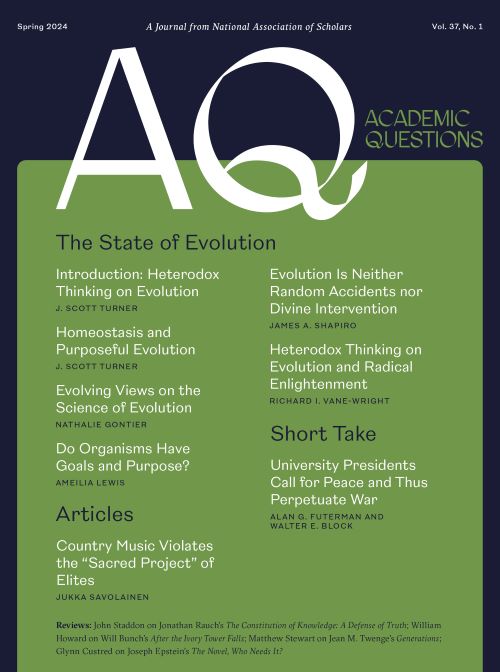THE STATE OF EVOLUTION
Introduction: Heterodox Thinking on Evolution
J. Scott Turner, SUNY College of Environmental Science & Forestry, emeritus, NAS.
Scott Turner, a member of the group of scientists called The Third Way of Evolution and coordinator for this feature, introduces readers to our look at the state of evolutionary science. Turner explains that the feature will survey the latest discoveries in a number of scientific disciplines, some of which have challenged the Darwinian “Modern Synthesis” and suggest the possibility of discovering purpose, intent, and agency in living organisms.
Homeostasis and Purposeful Evolution
J. Scott Turner, SUNY College of Environmental Science & Forestry, emeritus, NAS.
Life may exist in a physical world, writes Scott Turner, but it is also marked by attributes not to be found in that world, such as intentionality, purposefulness, design, and intelligence. The Darwinian idea seeks to explain evolution while avoiding those essential attributes of life. The widely misunderstood and trivialized concept of homeostasis might help us bridge the gap between our material and non-material understanding of life.
Evolving Views on the Science of Evolution
Nathalie Gontier, Faculty of Science, University of Lisbon.
Nathalie Gontier takes us on a romp through the predominant schools of evolutionary thought: Darwinism, the Modern Synthesis, Micro-, Meso-, and Macroevolution, Ecology, and Reticulate Evolution. Today, writes Gontier, no school “holds a privileged position over the other, and all have provided valid means whereby to study the pluralistic nature of evolution.”
Do Organisms Have Goals and Purpose?
Ameilia Lewis, Queen’s University, Belfast.
Zoologist Amelia Lewis argues for greater recognition of non-human animal sentience, cognition, and goal-directedness in evolutionary thought. Within the context of the Extended Evolutionary Synthesis (EES), she argues that individuals not only “respond to and manipulate their environment, but teleologically direct the course of their own evolution.”
Evolution Is Neither Random Accidents nor Divine Intervention: Biological Action Changes Genomes
James A. Shapiro, University of Chicago, emeritus.
Biologist James A. Shapiro believes the discovery of different biological means by which organisms can alter their genomes, along with the process of interspecific hybridization, demands a reassessment of how life evolves. “Thus, it is time to shift our basic concept of evolutionary variation from the traditional model of slow change from non-biological sources to a fully biological model of rapid genome reorganization stimulated by challenges to reproduction.”
Heterodox Thinking on Evolution and Radical Enlightenment
Richard I. Vane-Wright, Natural History Museum, London.
Between the Modern Synthesis—which says that evolution is driven by accidental genetic changes—and its heterodox challenges—which argue for various forms of agency and non-random processes, Richard Vane-Wright calls for a “Radical Enlightenment” that “counters homogenization of interpretation” with “diverse and even incompatible ontologies.” To avoid new orthodoxies from forming, we need “a critical yet embracing, respectful yet continuing, pluralism in science.”
ARTICLES
Country Music Violates the “Sacred Project” of Elites
Jukka Savolainen, Wayne State University
Sociologist Jukka Savolainen contrasts the media’s vicious treatment of country singers Jason Aldean and Oliver Anthony to the far more benign, or even laudatory, treatment of lawbreaking hip-hop artists and concludes: country artists with populist messages “violate core assumptions of the left-liberal worldview, whereas the ultra-violent lyrics and behavior of hip-hop artists merely reinforce them.”
SHORT TAKE
University Presidents Call for Peace and Thus Perpetuate War
Alan G. Futerman, Walter E. Block, The Classical Liberal Case for Israel, (2021).
Alan G. Futerman and Walter E. Block conclude that the flood of statements from college presidents calling for peace in the Middle East will, in fact, make peace less likely.
REVIEWS
AQ authors review four important books in the spring 2024 issue. First, Duke University scientist John Staddon reviews Jonathan Rauch’s The Constitution of Knowledge: A Defense of Truth and concludes that Rauch’s admirable effort falls short in its attempt to reconcile deference to objectivity with respect for collective judgement.
William Howard tells us that Will Bunch’s After the Ivory Tower Falls: How College Broke the American Dream and Blew up Our Politics—And How to Fix It “will appeal to journalists, activists, ‘never Trumpers,’ and a few academics who might appreciate journalism that reinforces their social predilections.” For Bunch, the blame for higher education’s problems lies with the federal government’s refusal to make college “free,” and, rather implausibly, the hostility found in “red” communities surrounding many college campuses.
Matthew Stewart reviews psychologist Jean M. Twenge’s magnum opus Generations: The Real Differences Between Gen Z, Millennials, and Silents—and What They Mean for America’s Future, which describes six living United States generational cohorts separated by increments of fourteen to twenty-one years. Twenge’s fascinating book, according to Stewart, is full of sociological insights based on her compelling argument that the technology available in the era when a person is born “has a larger effect on your personality and attitudes than the family who raised you does.”
Finally, anthropologist Glynn Custred discusses the place of the novel in liberal arts education, a question sparked by the recent publication of Joseph Epstein’s The Novel, Who Needs It? Novels are important, says Epstein, because they provide knowledge that can’t always be enumerated or subjected to strict testing as with other kinds of study. But the genre is suffering today because “large segments of the culture are no longer open to honest discussion.”
Photo by Richie Nolan on Unsplash













